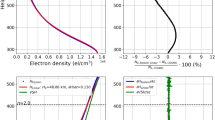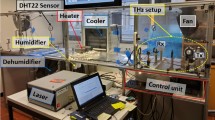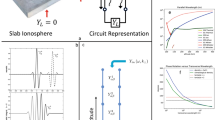Abstract
THE forthcoming advent of the Polar Beacon Ionosphere Satellite1 has again focused scientific interest on the use of simultaneous Faraday rate and Doppler measurements for obtaining further new data about the integrated electron density along paths in the ionosphere. It might be useful, therefore, to describe a method by means of which the electron content can be obtained without approximation assumptions other than the following: isotropic and static medium, validity of reciprocity theorem, and equal propagation paths (for the various frequencies used simultaneously).
This is a preview of subscription content, access via your institution
Access options
Subscribe to this journal
Receive 51 print issues and online access
$199.00 per year
only $3.90 per issue
Buy this article
- Purchase on Springer Link
- Instant access to full article PDF
Prices may be subject to local taxes which are calculated during checkout
Similar content being viewed by others
References
Bourdeau, R. E., S-66 Polar Beacon Ionosphere Satellite, X-615-62-99, NASA—GSFC.
Garriott, O. K., Proc. First Intern. Space Sci. Symp., Nice, 371 (1960).
Swenson, jun., G. W., The Utilization of Ionosphere Beacon Satellites, X-250-62-32, NASA—GSFC.
Author information
Authors and Affiliations
Rights and permissions
About this article
Cite this article
ARENDT, P. Measurement of Ionospheric Electron Content Regardless of Approximations. Nature 197, 579–580 (1963). https://doi.org/10.1038/197579a0
Issue Date:
DOI: https://doi.org/10.1038/197579a0
Comments
By submitting a comment you agree to abide by our Terms and Community Guidelines. If you find something abusive or that does not comply with our terms or guidelines please flag it as inappropriate.



